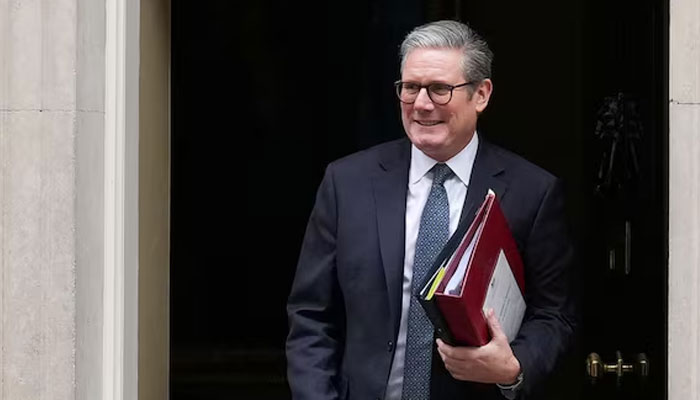UK’s Starmer pledges more growth reforms after budget hit to markets
LONDON: British Prime Minister Keir Starmer promised reforms to speed up the economy and overhaul the public sector after the Labour government’s first budget failed to boost the growth outlook and sent government bond prices into a two-day dive.
Finance minister Rachel Reeves announced a plan on Wednesday that included big increases in tax, borrowing and spending, but Britain’s budget watchdog judged that economic growth beyond next year would be weaker than it previously thought.
British government bond prices fell in the hours after her speech and again on Thursday, sending borrowing costs up sharply, before stabilising on Friday.
Writing in the Financial Times on Saturday, Starmer said the budget was a “first step on our mission for growth” but also opened the way for reform of “our creaking central state” and its public services as well as more private sector investment.
“Just as we cannot tax and spend our way to prosperity, nor can we simply spend our way to better public services,” he wrote, addressing concerns that the health system and other services needed more than just extra cash to improve.
Some analysts have said that without reform the government may need to raise taxes again in future to fix the public sector, despite Reeves’ pledge that her budget was intended to “wipe the slate clean”.
Starmer listed plans to meet his promise to voters in July’s election to double Britain’s economic growth pace such as housing targets, planning system reforms, quicker approval of clean energy projects and a review of how regulators operate.
“This process involves detailed, often painstaking work. For that reason, it is not yet ready to be included in the OBR’s forecast for growth,” he said, referring to the Office for Budget Responsibility whose forecasts underpin the budget.
“However, we should be optimistic about the potential,” Starmer wrote, focusing on the importance of private sector investment alongside a big increase in public infrastructure spending.
The budget was quickly welcomed by the International Monetary Fund and on Saturday it also won applause from Mario Draghi, the former European Central Bank president who recently advised the European Union on how to boost competitiveness.
“The UK government has chosen to significantly raise public investment over the next five years and has adopted precise rules to ensure that borrowing is used only to fund this investment,” he wrote also in the FT.
“Moreover, in order to ensure the quality of spending, transactions will be validated by independent authorities. This increases the likelihood that public investment has a positive net present value and so supports fiscal sustainability.”
-
 'Elderly' Nanny Arrested By ICE Outside Employer's Home, Freed After Judge's Order
'Elderly' Nanny Arrested By ICE Outside Employer's Home, Freed After Judge's Order -
 Keke Palmer On Managing Growing Career With 2-year-old Son: 'It's A Lot'
Keke Palmer On Managing Growing Career With 2-year-old Son: 'It's A Lot' -
 Key Details From Germany's Multimillion-euro Heist Revealed
Key Details From Germany's Multimillion-euro Heist Revealed -
 David E. Kelley Breaks Vow To Cast Wife Michelle Pfeiffer In 'Margo's Got Money Troubles'
David E. Kelley Breaks Vow To Cast Wife Michelle Pfeiffer In 'Margo's Got Money Troubles' -
 AI-powered Police Robots To Fight Crime By 2028: Report
AI-powered Police Robots To Fight Crime By 2028: Report -
 Everything We Know About Jessie J's Breast Cancer Journey
Everything We Know About Jessie J's Breast Cancer Journey -
 Winter Olympics 2026: What To Watch In Men’s Hockey Today
Winter Olympics 2026: What To Watch In Men’s Hockey Today -
 Winnie Harlow Breaks Vitiligo Stereotypes: 'I'm Not A Sufferer'
Winnie Harlow Breaks Vitiligo Stereotypes: 'I'm Not A Sufferer' -
 Apple Martin Opens Up About Getting 'crazy' Lip Filler
Apple Martin Opens Up About Getting 'crazy' Lip Filler -
 Why Did OpenAI Remove One Crucial Word From Its Mission Statement?
Why Did OpenAI Remove One Crucial Word From Its Mission Statement? -
 Prince William Warned His Future Reign Will Be Affected By Andrew Scandal
Prince William Warned His Future Reign Will Be Affected By Andrew Scandal -
 Amy Madigan Reflects On Husband Ed Harris' Support After Oscar Nomination
Amy Madigan Reflects On Husband Ed Harris' Support After Oscar Nomination -
 Is Studying Medicine Useless? Elon Musk’s Claim That AI Will Outperform Surgeons Sparks Debate
Is Studying Medicine Useless? Elon Musk’s Claim That AI Will Outperform Surgeons Sparks Debate -
 Margot Robbie Gushes Over 'Wuthering Heights' Director: 'I'd Follow Her Anywhere'
Margot Robbie Gushes Over 'Wuthering Heights' Director: 'I'd Follow Her Anywhere' -
 'The Muppet Show' Star Miss Piggy Gives Fans THIS Advice
'The Muppet Show' Star Miss Piggy Gives Fans THIS Advice -
 Sarah Ferguson Concerned For Princess Eugenie, Beatrice Amid Epstein Scandal
Sarah Ferguson Concerned For Princess Eugenie, Beatrice Amid Epstein Scandal




